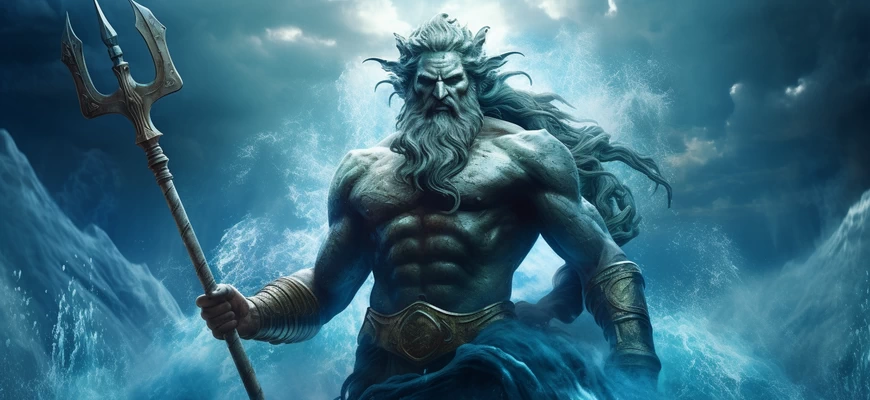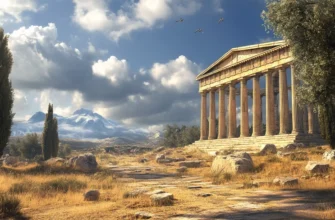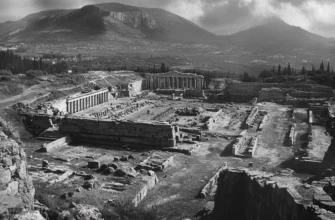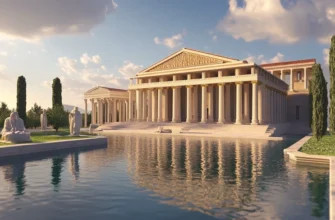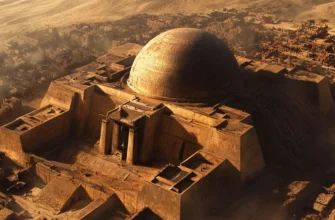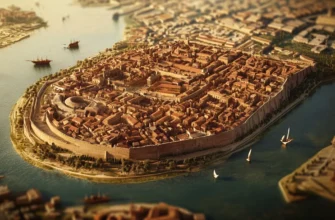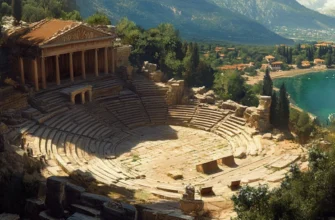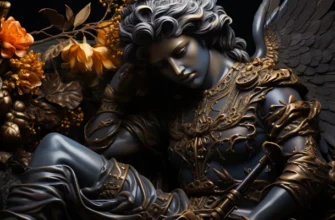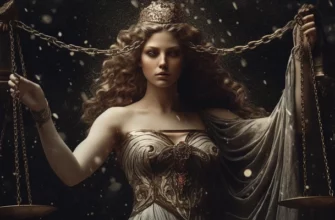Poseidon is the god of the seas, oceans, natural disasters, earthquakes, and horses in ancient Greek mythology. He belonged to the Olympian pantheon, which consisted of the highest gods. Poseidon had great power over the water elements, from seas and rivers to lakes and springs. He was often depicted as a powerful man with a trident and horses, symbolizing his power over the sea forces and storms. The god was also very important to sailors and merchants, and his image often reflected the capriciousness and unpredictability of the sea. The role of the god in the pantheon of the Olympian gods.
- Mythological aspects
- Origin and ancestry of Poseidon: son of Titan Cronus and Rhea
- Symbolism and attributes
- Poseidon as the ruler of the seas, oceans, and elements
- Role in the lives of ancient Greeks
- Legends and stories
- Depictions of Poseidon in art, literature, and modern culture
- The symbolic meaning of Poseidon for the modern world
- Conclusions
- In ancient Greek mythology:
- In the modern world:
- Influence on Greek culture:
Mythological aspects
Origin and ancestry of Poseidon: son of Titan Cronus and Rhea
In ancient Greek mythology, Poseidon was the son of the Titan Cronus and Rhea, who belonged to the ancient genealogy of the gods. Cronus, Poseidon’s father, wanted to get rid of his children because he predicted that they would overthrow him. Therefore, he swallowed his children: Demeter, Hera, Hestia, Poseidon, Hades, and Zeus.
Saved from this fate, Zeus, together with his brothers and sisters, began a rebellion against Cronus. Led by Zeus, the gods freed their father Cronus and defeated the Titans, ending their reign. This struggle for power among the gods became one of the key events in Greek mythology and largely determined the fate of Poseidon and his brothers.
The struggle for power in the Olympian pantheon: the myth of the Titanomachy
The myth of the Titanomachy is one of the most significant episodes in ancient Greek mythology, in which a struggle for power took place between the Olympian gods and the Titans, ancient deities. The key figure in this struggle was Zeus, son of Cronus and Rhea, who united the Olympian gods in an attempt to overthrow the Titans from their throne.
The Titans, led by Cronus, represented the old pantheon of power, while the Olympian gods symbolized a new generation of deities. The war, which lasted for decades, ended with the victory of the Olympians. Zeus, Poseidon, Hades, and their allies defeated the Titans, who were stripped of their power over the world.
This mythological war became a symbol of the victory of a new generation of gods over the old regime and the establishment of the Olympian order in the ancient Greek pantheon.
Symbolism and attributes
Poseidon as the ruler of the seas, oceans, and elements
In ancient Greek mythology, Poseidon is known for his power over the seas, oceans, and elements. He is the ruler of the invincible forces of nature, which he can subdue at will. His symbols are deep waters and powerful natural forces.
Visually, Poseidon is often depicted with a trident, his famous attribute. This trident served both as a symbol of his power over the waters and as a tool for summoning the forces of nature. The god is also often depicted on a chariot pulled by powerful horses that he created with his own strength.
Poseidon’s symbolism reminds us of the balance between the inspiring power of the seas and their unpredictability. He played an important role in the lives of ancient Greek sailors and was an object of worship for those who depended on the sea and its gifts.
Trident (trident, trident): One of Poseidon’s most famous attributes is his trident, a symbol of his power over the depths of the sea. This attribute is also associated with his ability to summon natural forces such as storms and earthquakes.
Horses: Poseidon was considered the creator of horses, and they were another important attribute of the god. His dual aspect as god of the seas and horses emphasized his influence on maritime trade and navigation.
Tritons: Tritons are sea creatures with the upper body of a human and the lower body of a fish, often associated with Poseidon. These sea creatures served as his messengers and heralds.
These attributes helped to reflect Poseidon’s power and role as ruler of the seas and the elements, as well as emphasizing his important place in Greek mythology.
Role in the lives of ancient Greeks
Poseidon had a significant influence on the lives of ancient Greeks, especially those who lived near the sea. The cult of Poseidon was widespread and included various rituals, sacred places, and festivals:
Rituals and sacrifices: Sailors and fishermen believed in Poseidon’s influence over the elements. They performed rituals and made sacrifices to the god before going out to sea to ensure safety and good luck.
Sacred sites: Many coastal cities had their own shrines and temples dedicated to Poseidon. The most famous of these is the Temple of Poseidon at Cape Sounion, located at the southern tip of Attica. This temple served as a place for rituals and worship of the god.
Festivals: Important festivals dedicated to Poseidon were held in various parts of Greece. For example, Athens celebrated the annual Poseidonia festival, which included sea races and other competitions.
The cult of Poseidon was an important aspect of the lives of ancient Greek sailors and coastal dwellers, helping them to cope with the natural forces of the sea and ensure prosperity in their relationship with the oceans.
Legends and stories
Creation of horses: According to one legend, Poseidon created horses by striking the ground with his trident. This act took place at a time when he was competing with the god Helios for control of a certain region. This legend highlights Poseidon’s important role in the creation of horses, which were extremely important to the ancient Greeks in many aspects of life.
The struggle with Athena for Athens: The story of the struggle between Poseidon and Athena, the goddess of wisdom, for control over Athens (the capital of Attica) is well known. According to legend, both gods gave the city valuable gifts: Poseidon gave salt water, and Athena gave an olive tree. The inhabitants decided that Athena’s gift was more valuable, and Athena became the patron goddess of the city.
Odysseus’ journey: In Homer’s “Odyssey,” Poseidon plays an important role as Odysseus’ enemy. Poseidon is called upon to avenge the gods for the abuse of Polyphemus, one of the Cyclopes, whom Odysseus defeated in a contest. Poseidon interferes with the obstacles Odysseus encounters on his way home, delaying him for many years.
These legends and stories reveal deeper character traits of Poseidon and demonstrate his important role in ancient Greek mythology and literature.
Depictions of Poseidon in art, literature, and modern culture
Poseidon has had a major influence on various aspects of culture, including art, literature, and modern culture:
Art: Images of Poseidon became popular motifs in ancient Greek and Roman sculpture and painting. He was often depicted with a trident, horses, and other attributes that reflected his power over the sea and the elements. His image became a symbol of the power and invincibility of natural forces.
Literature: Legends about Poseidon and his deeds became an integral part of Greek and Roman mythology. His role in Homer’s Odyssey and other literary works emphasized his importance as the god of the seas, as well as his relationship with humans and other gods.
Modern culture: Poseidon’s symbolism is often used in modern culture. His image can be found in company logos, brand names, books, films, and other mass media. He leaves his mark on modern scientific research, metaphors, and allegories, giving his symbolism a deep historical and cultural meaning.
Overall, the image of Poseidon permeates various aspects of culture, helping to maintain a connection with the ancient heritage and revealing the deeper meaning of natural forces and their impact on human life.
The symbolic meaning of Poseidon for the modern world
Poseidon also leaves his symbolic mark on the modern world, giving meaning and nuance to various aspects of our lives:
The power of the elements: The image of Poseidon reminds us of the power of natural forces that we cannot always control. His presence reminds us of the powerful and relentless natural force that influences our lives.
Power and responsibility: As the ruler of the seas, Poseidon symbolizes responsibility for nature and its resources. His image reminds us of the importance of balance and careful use of marine resources, as well as the impact of humans on the natural environment.
The call of adventure: Poseidon is also associated with sea adventures and voyages. His image gives us the courage to venture into unknown depths, strive for new achievements, and overcome obstacles.
Symbol of cultural heritage: Poseidon reflects the deep roots of ancient culture and its influence on the modern world. His image reminds us of the importance of history, mythology, and our connection to the past.
In the modern world, the image of Poseidon remains a symbol of natural power, responsibility towards nature, and cultural heritage, providing a deep historical and symbolic context to the contemporary perception of the world.
Conclusions
Poseidon, the ancient Greek god of the seas and oceans, has retained his significance and influence in both the ancient world and the modern world. His role and symbolism have an important legacy in mythology and culture:
In ancient Greek mythology:
Poseidon represented power over the sea and natural forces.
Legends about him told of his creative influence on nature, the creation of horses, and his role in the events of the Olympian pantheon.
In the modern world:
The image of Poseidon has symbolic meaning, reminding us of the power of the elements and the importance of natural resources.
His influence is felt in art, literature, philosophy, and scientific research.
Poseidon also serves as a guide on how to overcome challenges, conquer unpredictability, and achieve adventure.
Influence on Greek culture:
Poseidon played an important role in the lives of sailors, sea traders, and coastal dwellers, creating cults and rituals associated with the sea.
He influenced Greek mythology, art, and religious practices, reflecting man’s connection with nature and the divine world.
In conclusion, Poseidon is a symbol of powerful natural forces, an important influence on culture and worldview, who crossed the barrier of time and left his mark on both the past and the present.
